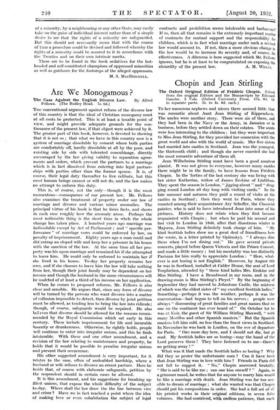Are We Monogamous ?
The Case Against the English Divorce Law. By Alfred . Fellows. (The Bodley Head. 7s. 6d.)
THE conventional argument against reform of the divorce law of this country is that the ideal of Christian monogamy must at all costs, be protected. This is at least a tenable point of view, and might provide adequate grounds for the con- tinuance of the present law, if that object were achieved by it. The greater part of this book, however, is devoted to showing that it is not so ; that what we have in this country now is a system of marriage dissoluble by consent where both parties are comfortably off, hardly dissoluble at all by the poor, and existing side by side with tolerated concubinage, directly encouraged by the law giving validity to separation agree- ments and orders, which prevent the partners to a marriage which is in fact dissolved from entering into legal partner- ships with parties other than the former spouse. It is, of course, their legal duty thereafter to live celibate, but this most human beings cannot or will not do, and the law makes no attempt to enforce this duty.
This is, of course, not the only—though it is the most momentous—consequence of our present law. Mr. Fellows also examines the treatment of property under our law of marriage and divorce and various minor anomalies. The principal virtue of his book is that he faces facts, and shows in each case roughly how the anomaly arose. Perhaps the most noticeable thing is the short time in whch the whole change has taken place. A hundred years ago marriage was indissoluble except by Act of Parliament ; and " specific per- formance " of marriage vows could be enforced by law, on penalty of imprisonment. Eighty years ago a man could and did entrap an eloped wife and keep her a prisoner in his house with the sanction of the law. At the same time all her pro- perty was his upon marriage and remained his if she attempted to leave him. He could only be enforced to maintain her if she lived in his house. To-day her property remains her own, and if she chooses to leave him the law will take nothing from her, though their joint family may be dependent on her income and though the husband in the same circumstances will be mulcted of at least a third of his income on her application.
When he comes to proposed reforms, Mr. Fellows is also clear and sensible. He argues that, since any form of divorce will be turned by the persons who want divorce into a matter of collusion impossible to detect, then divorce by joint petition must be allowed, as tending less to bring the law into ridicule; though, of course, safeguards would be required. He also btl:eves that divorce should be allowed for the reasons recom- mended by the Royal Commission which sat early in this century. These include imprisonment for life and incurable Insanity or drunkenness. Otherwise, he rightly holds, people will continue to enter into irregular unions, and this he finds intolerable. With these and one other amendment, and a revision of the law relating to maintenance and property, he holds that it would be possible to penalize irregular unions and prevent their occurrence.
His other suggested amendment is very important, for it relates to the case, often of undoubted hardship, where a husband or wife refuses to divorce an errant partner. Here he holds that, of course with elaborate safeguards, petition by the respondent should in certain cases be allowed.
It is this amendment, and his suggestions for breaking up illicit unions, that expose the whole difficulty of the subject to-day. Where shall the law draw the the line between vice and crime ? Have we in fact reached a point where the idea of making love or even cohabitation the subject of legal contracts and prohibition seems intolerable and barbarous! If so, then all that remains is the extremely important matter of contracts for mutual support and the responsibility for children, which is in fact what marriage under such a revised law would amount to. If not, then a more obvious change is the law would be to increase its severity and, of course, its effectiveness. A dilemma is here suggested which Mr. Fellows ignores, but he is at least to be congratulated on exposing the absurdity of the present law. A. M. WELLS.






























 Previous page
Previous page